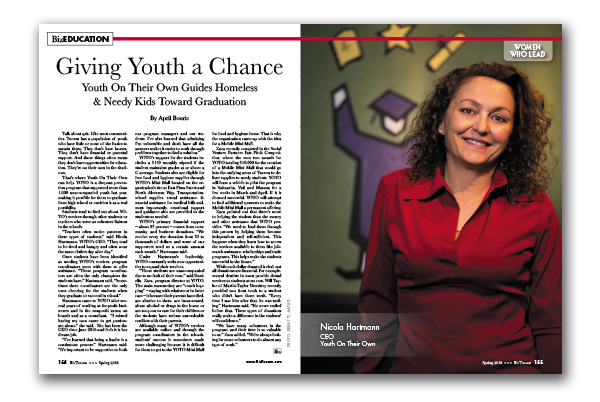
Giving Youth a Chance
By April Bourie –
Youth On Their Own Guides Homeless & Needy Kids Toward Graduation
Talk about grit. Like most communities, Tucson has a population of youth who have little or none of the basics to sustain them. They don’t have homes. They don’t have financial or parental support. And those things often mean they don’t have opportunities for education. They’re on their own in the shadows.
That’s where Youth On Their Own can help. YOTO is a dropout prevention program that supported more than 1,600 unaccompanied youth last year, making it possible for them to graduate from high school or envision it as a real possibility.
Students tend to find out about YOTO’s services through other students or teachers who serve as volunteer liaisons in the schools.
“Teachers often notice patterns in these types of students,” said Nicola Hartmann, YOTO’s CEO. “They tend to be tired and hungry and often wear the same clothes day after day.”
Once students have been identified as needing YOTO’s services, program coordinators meet with them to offer assistance. “These program coordinators are often the only champions the students have,” Hartmann said. “Sometimes these coordinators are the only ones cheering for the students when they graduate or succeed in school.”
Hartmann came to YOTO after several years of working at for-profit businesses and in the nonprofit arena on boards and as a consultant. “I missed having my own cause to get passionate about,” she said. She has been the CEO since June 2016 and feels it is her dream job.
“I’ve learned that being a leader is a continuous process,” Hartmann said. “It’s important to be supportive to both our program managers and our students. I’ve also learned that admitting I’m vulnerable and don’t have all the answers makes it easier to work through problems together to find a solution.”
YOTO’s support for the students includes a $140 monthly stipend if the student maintains grades at or above a C average. Students also are eligible for free food and hygiene supplies through YOTO’s Mini Mall located on the organization’s site at East Pima Street and North Alvernon Way. Transportation, school supplies, rental assistance, financial assistance for medical bills and, most importantly, emotional support and guidance also are provided to the students as needed.
YOTO’s primary financial support – about 97 percent – comes from community and business donations. “We receive every size donation from $5 to thousands of dollars, and some of our supporters send us a certain amount each month,” Hartmann said.
Under Hartmann’s leadership, YOTO constantly seeks new opportunities to expand their services.
“These students are unaccompanied due to no fault of their own,” said Daniella Zaza, program director at YOTO. The main reasons they are “couch hopping” – staying with relatives or in foster care – is because their parents have died, are abusive to them, are incarcerated, abuse alcohol or drugs in the home or are too poor to care for their children or the students have serious unresolvable conflicts with their parents.
Although many of YOTO’s services are available online and through the program coordinators in the schools, students’ success is sometimes made more challenging because it is difficult for them to get to the YOTO Mini Mall for food and hygiene items. That is why the organization came up with the idea for a Mobile Mini Mall.
Zaza recently competed in the Social Venture Partners Fast Pitch Competition, where she won two awards for YOTO totaling $10,000 for the creation of a Mobile Mini Mall that would go into the outlying areas of Tucson to deliver supplies to needy students. YOTO will lease a vehicle to pilot the program in Sahuarita, Vail and Marana for a few weeks in March and April. If it is deemed successful, YOTO will attempt to find additional sponsors to make the Mobile Mini Mall a permanent offering.
Zaza pointed out that there’s more to helping the student than the money and other assistance that YOTO provides. “We need to lead them through this process by helping them become independent and self-sufficient. This happens when they learn how to access the services available to them like job-search assistance, scholarships and trade programs. This helps make the students successful in the future.”
While each dollar donated is vital, not all donations are financial. For example, several dentists in town provide dental services to students at no cost. Will Taylor of Martin-Taylor Dentistry recently provided two front teeth to a student who didn’t have those teeth. “Every time I saw him after that, he was smiling,” Hartmann said. “He never smiled before that. These types of donations really make a difference in the students’ self-confidence.”
“We have many volunteers in the program, and their time is so valuable to us,” Zaza added. “We’re always looking for more volunteers to do almost any type of work.”





